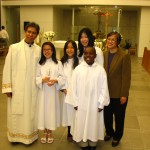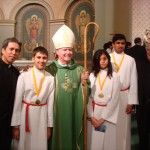The most important day of the year for we Christians is the day Jesus was raised from the dead to the glory of God the Father.
Today we celebrate the birth of Jesus, a date we really do not know but a date decided on by the church centuries ago. The Romans had a feast called the feast of the unconquerable sun, celebrating the winter solstice and decided this would be a good time to celebrate the birth of Jesus, the unconquerable son of God.
May we be gifted to see beyond the infant lying in a manger and come to appreciate the full meaning of this feast? St. Paul tells us that Christ emptied himself of his divinity and took to himself our humanity, becoming like us in all things, though he did not sin. Jesus’ assuming our humanity has clothed us in his divinity. St. John tells us that ‘before the world began God chose us in Christ to be his adopted sons and daughters.’ John also muses, ‘ this is the wonder, not that we love God but that God first loved us and sent his Son into the world to save us from our sins.
This feast of Christmas has a message we all need to hear. It is a message of our own human dignity. Every one of us is precious to God, every one of us is important to God. If this is true of us it is just as true of every person who comes into our lives regardless of the racial origin, their faith, their sexual orientation, be they rich or poor, woman or man. They are precious to God and the child whose birth we celebrate today died on the cross for each one of them as he died for us.
This being so we really have to take care that we do not be influenced by the negative rhetoric we hear on both sides of the 49th parallel that calls us to be suspicious of men and women who dress differently, look differently, believe differently from ourselves. It’s called xenophobia, the fear of the different, and the stranger. The stranger is dangerous. The stranger is to be watched, avoided. This fear of the stranger, the different is the cause of bigotry, prejudice and intolerance. Negative forces in society and in our lives, negative forces that blind us to the goodness in other peoples of other races and faiths, negative forces that deny we are all sons and daughters of our loving God. An article in the Star told on an increase in vandalism of Synagogues and Mosques. Such acts are totally un-Christian and offensive to God.
There are two images of Jesus that are the most common; one is the image of the infant Jesus holding his arms open looking for our embrace. The other is the open arms of the crucified Jesus, open to embrace us sinful and struggling humans.
These arms are open to us and to every person who comes into our lives. On this great feast of God’s love for each one of us may we be blessed to live lives of open minds, open hearts, open arms, and welcome all our brothers and sisters who come into our lives in all the circumstance of our lives.
A blessed Christmas to you and yours.
 Founded by St. Paul of the Cross, every Passionist takes a special vow to spend his or her energies in promoting remembrance of the sufferings of Jesus, the memory of the Cross, and reflection of the meaning of the Cross for the world.
Founded by St. Paul of the Cross, every Passionist takes a special vow to spend his or her energies in promoting remembrance of the sufferings of Jesus, the memory of the Cross, and reflection of the meaning of the Cross for the world.




